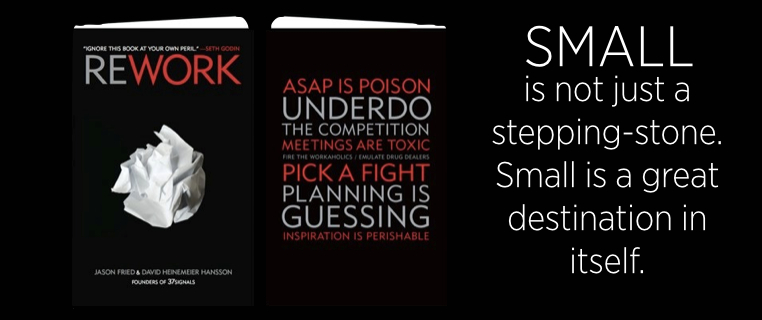“Don’t grow” is the last advice you’d expect to hear from a keynoter at an Inc. magazine gathering called the Grow Your Business Conference, or “GROWCO.” But that was the first bit of advice the 1,000 GROWCO attendees heard last week from Jason Fried, founder and CEO of Basecamp (formerly, 37 Signals), the company behind the popular Basecamp project management and collaborative software. Remembering the audience, Fried backtracked and explained, If a company chooses to grow, “I’m a believer in the ‘grow slow’ approach to business.”
Such advice comes as no surprise to readers of Fried’s 15 years of posts on his company’s popular and influential blog, Signal vs. Noise or who have read any of his books, like Rework
, the New York Times best-seller he co-wrote with his Basecamp partner, David Heinemeier Hansson
.

(Photo: SmallBusiness.com)
Growth should not be the goal of every business, Fried told the GROWCO attendees. And rarely, if ever, should the goal be the fast kind of “hockey stick” growth that is associated with the tiny slice of startups who receive the majority of coverage by tech-focused digital media covering startups: the extraordinarily rare company that obtains backing from a venture fund. (See at the bottom of this post for an explanation of just how extraordinarily rare.)
Fried laments that such obsession with venture-backed startups is leading those who create startups to convince themselves their goals should be to secure three rounds of funding and then hope for an exit strategy where they sell their product to Facebook or Google. Even on the rare occasions a startup pulls off such an incredibly rare series of fundings and sale, the full potential of the product is never achieved, says Fried. “Most of the time, the startup’s product goes away and the customers who made it valuable end up with nothing.”
[On SmallBusiness.com: How Starting a Business is Different From Starting a Startup.]

Accepting funding turns over the company’s timetable to the backers, said Fried. (When asked to clarify that point of view with the investment in 37 Signals in 2006 by Amazon’s Jeff Bezos, Fried said that it was not “funding,” but rather he had sold some of his personal shares of 37 Signals to Bezos’s personal investment company, not to Amazon or any venture fund with which Bezos or Amazon might be associated. “None of that investment went into ‘funding’ the company,” he said.)
“Eventually, customers won’t trust any startup,” said Fried. Today’s founders who are raising three rounds and flipping the product to a big company are destroying the ability of future startups to attract customers to their product, he explained.
Steady, sustainable growth that can provide customers with a great product and security and a good quality of life to those who work at Basecamp is what Fried has focused on for his own company, and has advocated in his writing. “Starting a business is easy,” he said.”Staying in business is hard.” Business that have stayed around for the long haul are those you should look to for inspiration, Fried told the entrepreneurs. Basecamp has even launched a one-article-per-month web magazine called The Distance that profiles companies that have been in business over 25 years.
 Practicing what he and his partners preach, the company Fried started in 1999 as a design firm and that later achieved rockstar status among a certain tribe of web developers for creating and open-sourcing the software “framework” called Ruby on Rails, recently used its 15th anniversary to rename itself Basecamp and to announce it is narrowing its focus to the company’s most popular (and profitable) product rather than to develop new products that would add to its overhead and dilute the focus needed to continue improving its core product.
Practicing what he and his partners preach, the company Fried started in 1999 as a design firm and that later achieved rockstar status among a certain tribe of web developers for creating and open-sourcing the software “framework” called Ruby on Rails, recently used its 15th anniversary to rename itself Basecamp and to announce it is narrowing its focus to the company’s most popular (and profitable) product rather than to develop new products that would add to its overhead and dilute the focus needed to continue improving its core product.
“We’ve always enjoyed being a small company,” he said when announcing the name and focus news. “Today we’re bigger than we’ve ever been, but we’re still relatively small at 43 people. So while we could hire a bunch more people to do a bunch more things, that kind of rapid expansion is at odds with our culture. We want to maintain the kind of company where everyone knows everyone’s name.”
 Advice on why you may not want to grow your business from Jason Fried’s and David Heinemeier Hansson book Rework:
Advice on why you may not want to grow your business from Jason Fried’s and David Heinemeier Hansson book Rework:
- Grow slow and see what feels right: premature hiring is the death of many companies.
- Small is not just a stepping-stone. Small is a great destination in itself.
- Have you ever noticed that while small businesses wish they were bigger, big businesses dream about being more agile and flexible?
- Avoid huge growth spurts too; they can cause you to skip right over your appropriate size.
- Anyone who runs a business that’s sustainable and profitable, whether it’s big or small, should be proud.
(From Rework by Jason Fried and David Heinemeier Hansson.)
A SmallBusiness.com footnote reality check: There are many, many ways to crunch the following numbers, but all of them, no matter how they are massaged, demonstrate what a tiny (nano? microscopic?) percentage of new businesses will ever receive funding from a venture capital fund. (For this reality check, the definition of “venture fund” means funds run by venture capital organizations that are members of the National Venture Capital Association.) In 2013, VCs invested $29.4 billion in 3,995 deals, according to the MoneyTree Report (PDF) from PricewaterhousCoopers. The Kauffman Foundation’s annual business creation report issued in April, 2014, reported that the rate of creation of new companies in 2013 was approximately 476,000 new business owners per month in 2013 compared with 514,000 the year before. As businesses also constantly close each month also (including VC-backed ones), the total number of companies remained relatively stable. The point? The gap remains enormous between the 4,000 startups that received any backing from venture funds in 2013 and the nearly six million new businesses that started. The bottomline: There is a big difference between starting a business and starting a startup.)
